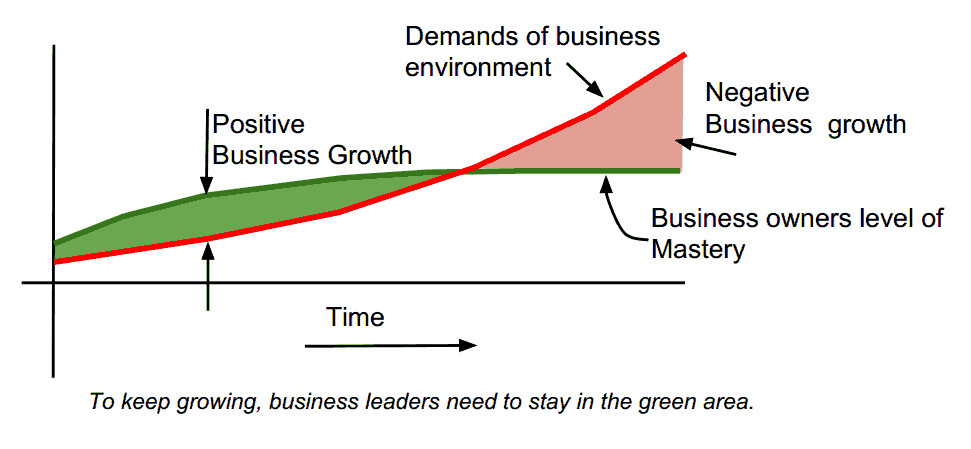I don’t think anyone would argue that success in business requires a high degree of mastery. Mastery over your environment. Your success will be in no small measure dependent on the dimensions and extent of your mastery.
The Free Online Dictionary defines mastery as “full command or understanding of a subject”. In business, that could encompass a wide range of things that could vary from business to business. Whatever they are, there is a minimum level of knowledge needed to achieve mastery, and there would be knowledge beyond that level too. The minimum level is what would be required to stay in business.
As time goes by, business conditions and the business environment gets more complicated and more sophisticated. This is not a linear progression but exponential. Just consider what has happened over the past 20 years. The advent of the internet has accelerated the pace of change of technology and business at a rate that would boggle the mind of most successful business people 50 years ago. Buckmaster Fuller observed that up till 1900, human knowledge doubled every century. By the end of World War II, it was doubling every 25 years. According to IBM, the build out of the Internet of Things will lead to the doubling of knowledge every 12 hours!
So what would have been considered a state of mastery 25 years ago, would unquestionably be well below what is required to thrive in business today.
Business Mastery
What are the main areas of mastery? These can be divided into two sections: domain mastery and business mastery. Domain mastery refers to all those industry specific topics that one needs to know to successfully operate in a particular field e.g. carpentry if you are a carpenter, Photoshop if you are a graphic designer etc. The education system is really very good at providing adequate domain mastery.
The other key business mastery topics are: Delivery Mastery, Time Mastery, Financial Mastery and Destination Mastery.
Delivery Mastery
Even in this day and age, one comes across glaring examples of the absence of delivery mastery, often when the human factor is involved. Delivery mastery is the ability to deliver on time, on price and on quality, every time. Bigger businesses engineer this into their process as do some smaller businesses. But it is quite common to encounter poor delivery mastery when dealing with small, local businesses. Businesses with these issues will find it increasingly difficult to compete as the world gets smaller. There is no longer safety in the notion that it is too hard for people to patronise more distant businesses. Customers nowadays have limited tolerance for poor delivery and will vote with their mice.
Time Mastery
People and labour are usually the largest expense of a business. So it is incumbent on management to see that they are used carefully and judiciously. This is far less of a problem where there is a fixed labour cost per unit of production than when people are paid for their time. Time mastery is concerned with getting maximum results within the minimum time. It deals with topics such as planning, scheduling, prioritisation, delegation, attitudes and mindset.
Financial Mastery
A business is nothing more than a systematic arrangement for making money. As simple as this sounds, it can become very complex and elaborate with many moving parts operating with various degrees of independence. Making sense of such a system can be difficult. Financial Mastery is the ability to gain clarity from this and to use information gained through appropriate measurements to make better management decisions. Of course it includes your standard financial reports and statements, but goes further to include operational measurements as well.
Destination Mastery
To a great degree the outcomes that a business can obtain largely depend on how the business vision was hatched and developed. Developing a clear picture of the end result and then a plan to get there are what destination mastery is all about. Nowadays, we tend to put a lot of energy into conceptualising and planning, simply because it is easier, quicker and cheaper to do it that way than just forging ahead through trial and error. But it takes effort and know-how, and so, many people in business don’t do it and end up underachieving.
Business Mastery can be thought of as the measure of our response to the demands of the business environment. Where our mastery exceeds that of the needs of the environment, we will thrive; when it is insufficient, the pressure of the environment will work to diminish our prosperity. The astute business leader will work to keep his level of mastery at a level where his knowledge exceeds the threshold needs, thus affording him an opportunity to build wealth.



This information is a diamond in our business growth and every day running of our business.
Truly Evan is a man with great insight into the how, and a forward thinking
business development strategist.
Mark Harris,HARCON